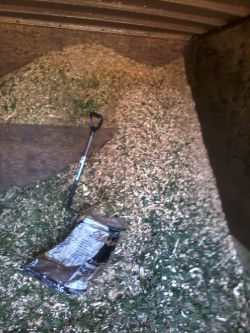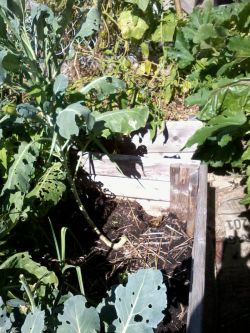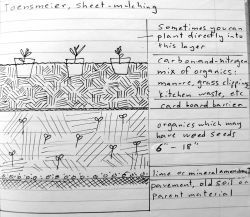Halifax Media Co-op
News from Nova Scotia's Grassroots
Free Soil in the City

There are many free sources of compostable material in the city. Turn waste streams into resource streams!
Most cities on the Eastern seaboard experience soil contamination from arsenic and lead. Many choose to build raised beds to grow food in fertile soil one can be sure of. I am often asked by clients and friends for economical ways to fill a series of raised beds, which usually entails several cubic yards of soil.
The most obvious route is to buy soil from a landscaping company. Each bed may need 1/2 to 1 cubic yard. I fit six beds in my typical urban backyard. A reputable company will sell a soil/compost mix for around $30 a yard but this will include a delivery fee that is usually in the order of $80. There will also be a minimum purchase of 1/2 yard to 1 yard. Because of the delivery fee, larger purchases make sense. Furthermore landscaping companies tend not to allow customers to split purchases by dumping in two locations (though if you move the soil by wheelbarrow or truck to your friends house, who's to know). This option will cost a couple hundred dollars.
One problem with buying topsoil is that it's removed from an area of land and not replaced. Topsoil can take thousands of years for nature to create. Sometimes soil is removed from farmland and sold, and one cannot be sure if it has been treated with pesticides, some of which, in bygone days, may have contained yet more lead and arsenic (Paradise Lot, Eric Toensmeier, p33). There are no landscaping companies at this time in Nova Scotia that I know of that sell a product that is 100% compost or created soil. They all include 'mined' soil in some proportion. I try to purchase as high a percentage of compost as I can in a mix.
As an aside, it saddens me to see many gardeners needing to add further topsoil to their gardens every five to ten years. If you need to keep adding soil to your garden, if it is not creating more soil than it is using, then your garden is broken. Sometimes some of the soil is eroding off in mismanaged rainwater. But more often it is being oxidized by soil tilage: the soil is turned with a fork and oxygen in the air literally burns soil carbon, turning it into carbon dioxide. Also, carbon that would be added to the soil from falling leaves and organic material is raked up and sent away. At least in Halifax it is composted and not landfilled. These gardeners would never have a soil problem if they kept their leaves on site and composted them along with kitchen waste and as many organic materials as are created on site.
Returning to starting a new garden, a cheaper option is to buy broken bags of soil and manure from your local grocery or hardware store. If you can say you're providing for a community garden they may even give those ones away free.
For my raised beds I went to the Bengal Lancers on Bell road in downtown Halifax. They had more horse manure to give away than I would ever use in a lifetime. Stables usually has to pay a hefty fee to have the manure hauled away, so they are thrilled to see me at the door. The manure is fresh, of course, but the middle of the pile is hot enough to kill weed seeds. I filled my beds in the autumn and let it rot through the winter, or sometimes even planted in it directly. The composting process causes the soil level to drop (again through oxidation), but by then I could add some of my own finished compost to bring up the level. After a few years my raised bed soil will be more stable and levels will drop less. I have heard from Silas Magee of Little Foot Yurts that successive treatments of horse manure, though a wonderful free resource, can cause uncomposted wood chips to build up and borrow nitrogen from your plants, which harms them. This can be prevented by adding a nitrogen rich top dressing like manure or finished compost, or even diluted urine.
Many other soil ingredients can be gotten for free in the city if you are willing to wait a year or two for your raised bed's full production. Cafes are a source of used coffee grounds and sometimes coffee chaff. Brewers might give you spent barley mash if you ask nicely. Apple trees might have scabby apples or simply too many. Autumn leaves line the streets of all cities in North America already bagged neatly. Tree trimming companies have copious amounts of wood chips they also will gladly give you. Restaurants and farmer's markets can give you scores of buckets of high-nitrogen food scraps. People mowing lawns may give you high-nitrogen grass clippings. Wood shops have bags of untreated sawdust. I'm sure this list can go on. One consideration is that these establishments are often short on space and it is courteous to pick up buckets promptly, or bring containers with you and pick up what is available at the moment.
Eric Toensmeier gives a good recipe for a lasagna garden in Paradise Lot (2013). THis is a technique that could easily be used for raised beds. Though the mixture composts here as well and loses some volume, I've had no problem growing food in raised beds that were filled with even 8" of fertile soil.
If you are composting your own soil, it may take a few months to a year for your raised beds to get to full production. However besides being cheap to free you can be assured of the high quality and fertility of your soil, which will also help prevent plants from taking up contaminants like arsenic and lead. A year from now, you'll be glad you started.
The site for the Halifax local of The Media Co-op has been archived and will no longer be updated. Please visit the main Media Co-op website to learn more about the organization.




